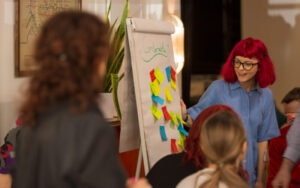Essential for Personal Growth and Relationship Mastery
Understanding how we categorise aspects of ourselves as “positive” or “negative” is a foundational skill for personal growth and mastering relationships. In the context of individual coaching or leadership development, self-awareness is not merely about knowing who you are but recognising how societal, cultural, and internalised judgments shape your self-perception.
The ORSC framework introduces the concept of the secret self—those hidden aspects of identity that remain suppressed due to fear of judgment or rejection. These hidden selves often hold untapped potential but are locked away by societal norms, stereotypes, or personal narratives that label them as undesirable. This labelling can obstruct authenticity and emotional resilience, both essential for cultivating healthy relationships and leading effectively.
By examining the influences shaping these judgments, individuals can transcend limiting beliefs, embrace their complexity, and create deeper, more meaningful connections in their personal and professional lives.
The ORSC Secret Self: Revealing Hidden Dimensions of Identity
The ORSC methodology highlights the importance of exploring the secret self. These are parts of us that we hide due to perceived inadequacy or incongruity with societal or personal ideals. For example:
- A leader might suppress their vulnerability, believing it conflicts with their authority.
- A professional might withhold creativity, fearing it will be judged as impractical.
The ORSC approach emphasises systems thinking, encouraging individuals to understand these selves within the broader context of their environment, relationships, and cultural background. When the secret self is acknowledged, individuals gain access to hidden strengths and dimensions of their identity that can enrich their lives and relationships.
How Do We Decide What Is Positive or Negative?
1. Stereotypes and Social Judgments
From an early age, we internalise societal messages about which traits are desirable. Assertiveness might be celebrated in one environment but criticised as aggression in another. Similarly, traits like introversion or sensitivity are often undervalued in cultures that prioritise extroversion and emotional restraint.
Research shows that stereotypes shape not only how others perceive us but also how we perceive ourselves. Internalised stereotypes can lead to self-doubt or overcompensation, influencing which aspects of our identity we suppress or highlight.
2. Cultural Norms and Expectations
Cultural frameworks play a significant role in determining which traits are seen as positive. For example:
- In individualistic cultures, independence and ambition are often praised, while humility may be overlooked.
- In collectivist societies, traits like harmony and empathy are prioritised, sometimes at the expense of assertiveness.
Such cultural expectations can create tension, particularly for individuals operating in cross-cultural contexts. A leader raised in a collectivist society might struggle to assert their ideas in a corporate setting, perceiving their humility as a disadvantage.
3. Personal Narratives and Internalised Judgments
Our personal experiences and upbringing also shape which parts of ourselves we embrace or reject. A child who was criticised for being “too emotional” might grow up suppressing their feelings, labelling emotional openness as a weakness. These narratives often persist into adulthood, limiting self-expression and authenticity.
Coaching interventions can help individuals identify and challenge these internalised judgments, fostering greater self-acceptance and personal growth.
Reframing the Negative Self: Finding Hidden Strengths
1. Challenging Stigma
Labelling parts of ourselves as negative often stems from societal bias rather than inherent flaws. For example, vulnerability—once dismissed as weakness—is now recognised as a critical leadership skill. Similarly, traits like introversion or cautiousness can be reframed as strengths, offering unique perspectives and fostering thoughtful decision-making.
2. Embracing Complexity
The ORSC framework encourages individuals to view the self as a system, where each part—positive or negative—contributes to the whole. By integrating these parts rather than suppressing them, individuals can achieve a more authentic and empowered identity.
For instance, overthinking, often viewed negatively, can translate into exceptional strategic planning when reframed as attention to detail. Similarly, emotional sensitivity can become a strength in roles requiring empathy and emotional intelligence.
Practical Steps for Coaches and Individuals
- Reflection Exercises:
Use prompts like “What part of myself do I hide the most, and why?” to encourage self-exploration. - Reframing Techniques:
Challenge negative labels by identifying contexts where these traits serve as strengths. - ORSC Tools:
Incorporate systemic exercises like sentence stems (“If you really knew me…”) to help clients explore their hidden selves safely.
Embracing the Full Self for Growth and Connection
By exploring the influences shaping our judgments of the self, we can move beyond limiting labels of “positive” and “negative.” The ORSC framework provides a powerful methodology for uncovering hidden strengths within the secret self, fostering authenticity, and building deeper, more fulfilling relationships.
True personal growth and relationship mastery begin when we stop judging ourselves and start embracing the full spectrum of who we are.
Join us for one of our courses in 2025.
References






